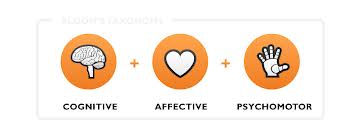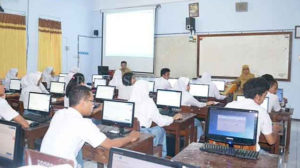By: Suparlan *)
Lecturer of FKIP University of Tama Jagakarsa
Abstract: In the previous writing, I try to explain the three main component of education: (1) students, (2) teachers, and (2) curriculum. The three components are the whole components that they can’t be separated. All components are very important among each other. When the students do not existed, who will teach the students? The process of education does not exist anymore. When the teacher do not exist in the process of teaching and learning who would like to teach the students? And then, when the curriculum does not exist, what subject matter will be taught to the student? What is the subject matter will be transferred to the students? That is why the three components of educations are the main components. In this cases which one the most important of the component of education form the three components? Or does the student or does the teacher, or does the curriculum? Or we can’t choose which once is the most important? As an old teacher when was in 1974’s we will belief that the most important component from all components of education is teacher. Or there is no one. That is why, Ho Chi Mienh, the father of Vietnamese, said that “No teacher, no education; no education, no social-economic development. Do we agree? We thought that the most important is the teacher. Digumarti Bhaskara Rao[1], the Indian expert said that “good education requires good teachers.” So, which is the most important of the educational components in National Education System? This writing would like to analyze the importance of every component based the status of human being for today to the next time of the productive years olds.
Key words: students, teachers, curriculum, the importance of the productive years, component of education.
Introduction
Human being is the highest level of our God Almighty. Our God Almighty created human being and all the creation in the world as the whole components. All creations of God Almighty are created as a system. Our body is created as a system. Universe is created as a system, such as solar system. All created as a system. Economy, social, culture, politics, transportations are created as a system. Off course education is created as system. That is why we have National Education System.
There are three elements of a system: (1) components of the system, (2) interrelationship between the components, and (3) objectives of the process of interrelationship or interlinked and integrated manner.
According to the Law Number 20 Year of 2003, “Indonesian nation educational system is the overall educational components are interlinked in an integrated manner to achieve national education goals.”
From the Law above, there are educational components, off course, more than one component. The components are interlinked in an integrated manner, and the last element is to achieve educational goals or objectives. The three elements of the national educational system are the holistic that can’t be separated. There are integrated manner to achieve educational objectives.
The components of education
The author believed that the people born are not alone. The components are born are not alone. Like the people are born with a single person. The components of education are not alone. There are the main three components of education: (1) students, (2) teachers or educators, and (3) curriculum. The main components are also the holistic, that can’t be separated. Without one of the three components, the proses of education do not exist. Without students, who will be studied? Without the teachers, who will teach them? Without the curriculum, what is learning material will be given to them? That is why the three components are the main components of education.
The importance of facilities
How does the existence of the facilities in national education system? Does these facilities very important in the national education system? Do we need the white board and all kinds of facilities in the process of education? Do we need school building for the process of education? Do we need in focus, computers, and any other kinds of facilities in the process of education? Yes, off course. But the facilities are just the supporting facilities. Why? Can the readers answer this question? I wait for the readers in the next writing.
National Standard of Education (NSE)
In the National Educational System, there are eight standard of national of educational: (1) standard of content or related to curriculum, (2) the standard of process (teaching-learning process), (3) graduate competency standards (related to students standards, (4) the standard of teacher and education personnel or related to teacher or education personnel, (5) the standard of educational facilities, (6) the standard of education management, (7) the standard of education financing, and (8) the assessment and evaluation standards of education.
Educational goals and objectives
Based on the National Standard of Education System, the question is which one is the most important components of education in the National Educational Standard. In the beginning of this writing, we understand that there are three components of the component of education: (1) students, (2) teachers, and (3) curriculum. The three components are the mean components. The existence of the facilities is the supporting components, are the supporting components.
Related to the eight standards of national education and three components of education, which is the most important component among the students, teachers, and the curriculum? There is an expert of education said that “the students is more important comparing with the subject that will be transferred to the student them self.” Yes this is true. Because the students, comparing with the teacher them self, the students are the young generation who will received the instructional leadership from the leaders. The leaders said that “All beginnings are difficult.” But the ending is easier, and all educational experts said that “the root of education is bitter, but the fruit is sweet.”
The last element of a system is educational goals and objectives. Educational goals are the macro system, and educational objectives are related to the micro system in the teaching and learning activities. The educational objectives are related to the national goals of education in the Preamble of the Constitution of 1945. The formulation of educational goals or objectives is stated in the Preamble of the Constitution of 1945. The formulation is as below:
“Then instead of it to form a government of Indonesia that (1) protect the entire Indonesian nation and the entire homeland of Indonesia and (2) to promote the general welfare, (3) educating the life of nation, and (4) participate in implementing world order based on freedom, lasting peace and social justice, then drafted the independence of Indonesian nationality it is a Constitution of the state of Indonesia, which is formed in an arrangement of the Republic of Indonesia the sovereignty of the people based on the basis of Pancasila as the basis of state and nation.
So, the formulation of educating the life of the state and nation called as to intellectualize the state and nation, the same formulation with the multiple intelligences. This formulation is the same with the three domains of educational objectives designed by Benjamin S. Bloom with the covering three domains of: (1) attitude or affective domain, (2) knowledge, or cognitive domain and (3) skills, or psychomotor domain, through the process in the physical activities or life skills domain. The three domains of educational objectives are the holistic goals of all teaching and learning activities.
Here is the National Educational System in Indonesia along the freedom of the state and nation. Along the process of implementation of education, this nation has six Laws of the National Education System:
(1) Law Number 04 Year 1950;
(3) Law Number 12 Year 1954;
(4) Law Number 22 Year 1961;
(5) Law Number 2 Year 1989; and
(6) Law Number 20 Year 2003.
Conclusion
There are some conclusions can be focused below:
- There are three main components of education: (1) students, (2) teacher, and (3) curriculum;
- System has three elements: (1) components, (2) interconnected, or interrelation among the components; (3) educational objectives or goals;
- There are four goals of state and national is formulated in the Preamble of Constitution of 1945: (1) protect the entire Indonesian nation and the entire homeland of Indonesia and (2) to promote the general welfare, (3) educating the life of nation, and (4) participate in implementing world order based on freedom, lasting peace and social justice.
- There are eight standards in national education system: (1) standard of content or related to curriculum, (2) the standard of process (teaching-learning process), (3) graduate competency standards (related to students standards, (4) the standard of teacher and education personnel or related to teacher or education personnel, (5) the standard of educational facilities, (6) the standard of education management, (7) the standard of education financing, and (8) the assessment and evaluation standards of education.
- All beginning is difficult, but the ending is easier. The root of education is bitter, but the fruit is sweet.
- So the student is more important than the subject itself, because the student will fill the taste of sweet of the fruit.
- Three domains of educational objectives designed by Benjamin S. Bloom: (1) attitude or affective domain, (2) knowledge, or cognitive domain and (3) physical skills, or psychomotor domain, through the process if the physical or raga or life skills.
- There are six Laws of the National Education System:
(1) Law Number 04 Year 1950;
(2) Law Number 12 Year 1954
(3) Law Number 22 Year 1961;
(4) Law Number 2 Year 1989; and
(5) Law Number 20 Year 2003.
References:
Djojonegoro, Wardiman. 1995. Fifty Years Development of Indonesian Education. Jakarta: Ministry of Education and Culture.
Suparlan. 2006. Guru Sebagai Profesi. Yogyakarta: Hikayat.
Suparlan. 2011. Tanya Jawab Pengembangan Kurikulum dan Materi Pembelajaran (Curriculum and Learning Material Development). Jakarta: Bumi Aksara.
Suparlan. 2016. Human Being and Writing. Masdik.com. Educational portal.
Jakarta, 30 September 2016
[1] Bhaskara Rao, Digumarti, 2003, Teachers in a Changing World, New Delhi: Discovery Publishing House, pp. 28.

